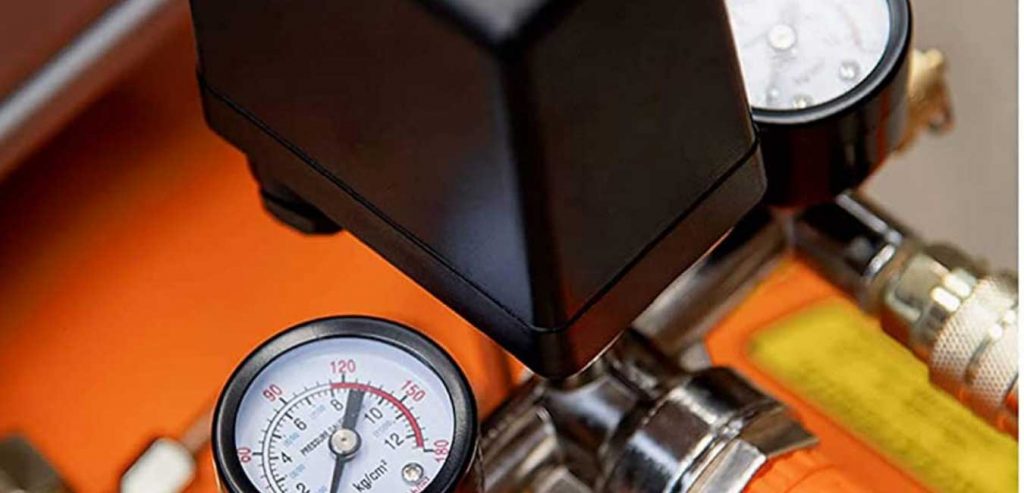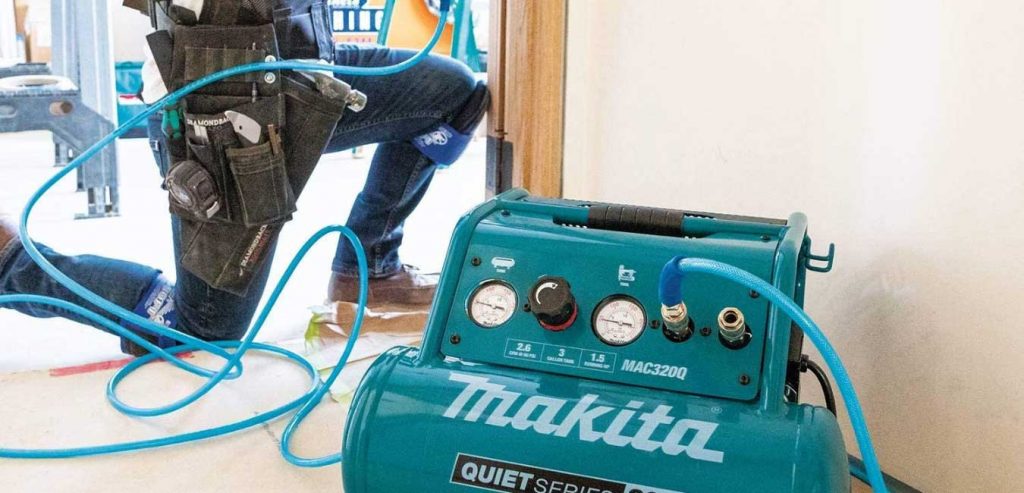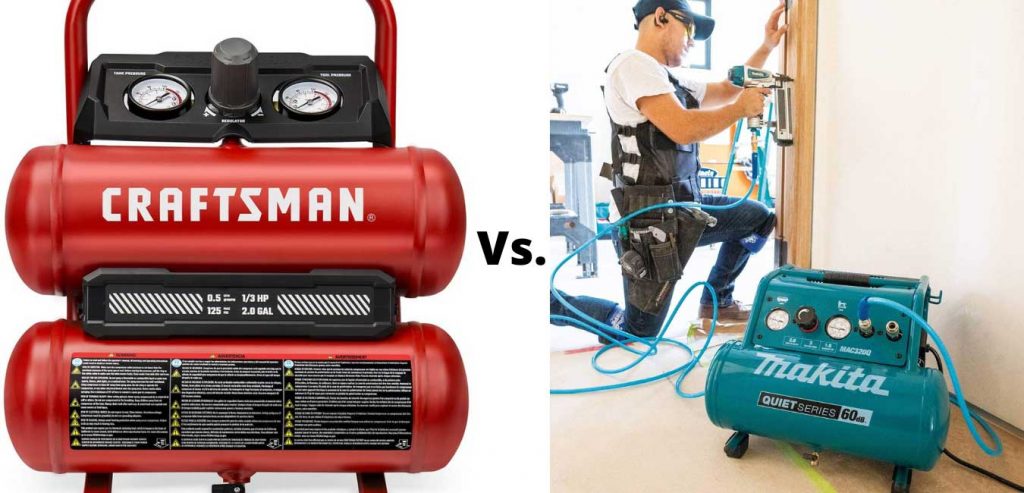Do you want to buy an air compressor? You must know the difference between oil vs oilless air compressor that’ll help you to choose the right compressor!
Whether you work at auto repairs or simply like to dabble in occasional house maintenance and renovations using a couple of air tools, you need an air compressor. This handy tool is one of the marvels of modern science that can make it extremely easy to work on a variety of projects.
But a problem most people run into when buying one for themselves is choosing between oil vs. oil-less air compressor. And unless you have a decent amount of experience with both variants, the question is not very surprising.
In this article, we will pit the two devices head to head and help you understand which one is better for your particular requirements.
Contents
What is an Oil Air Compressor?
Typically, an air compressor works using some sort of rotary elements such as a screw or a piston. The job of the rotary screw is to draw in air from the environment and store it into the tank after compression. Since the piston is constantly in motion, it requires lubrication from time to time.
That is where the oil comes in. The oil used in an air compressor mostly serves as a lubricant. In addition, since this type of compressor also produces a lot of heat, the oil also serves to transfer and dissipate heat efficiently while keeping the compressor performing well.

Most industrial compressors you find on the market require oil lubrication. This type of air compressor is also known to be more durable and can last quite a while with proper maintenance. Because of the lubrication system, it is also much quieter compared to an oil-free compressor.
However, there are a few drawbacks to this type of air compressor. For one thing, you need to put in a lot of maintenance hours for this device. Not only do you need to regularly change the oil, but you also need to look at the different components and clean them regularly.
Furthermore, this type of air compressor also tends to be quite heavy. Since most oil-lubricated air compressors are made for industrial applications, they are less likely to be portable enough for a casual user. They can also be much more expensive than oil-less air compressors. Besides, you also need to keep buying oil, which adds a bit to upkeep cost.
What is an Oil-free Air Compressor?
Oil-free air compressor, as the name suggests, requires no oil lubrication. These devices are much more compact compared to oil air compressors and require less maintenance. You do not need to put any oil lubrication, and usually, they come with a pre-lubricated system.
Instead of oil, these devices use Teflon lubrication. They are also quite a bit lighter and suitable for a DIY enthusiast. However, if you want to put it through a heavy workload, it might not give you the same level of performance that you would get with an oil air compressor.

Most oil-less air compressor even comes with a carrying handle that allows you to easily move it around. One of the major disadvantages of this type of unit is the high amount of noise they generate. If you are using it in a congested space with no sound treatment, the noise might get extremely annoying.
The lifespan of an oil-less air compressor is also not on par with that of an industrial-grade oil-lubricated air compressor. Even though you need a lot of maintenance with an oil air compressor, the durability of the unit is much higher than an oil-free compressor.
However, compared to an oil air compressor, the price of an oil-less air compressor is quite low. Although the power level of the two tools is drastically different, if you are looking for something lightweight and simple to use with your air tools, an oil-less air compressor is not a bad investment.
Differences between oil-lubricated and oil-free air compressors
Here are some key differences between oil-lubricated (oil) and oil-free (oil-less) air compressors:
| Oil-Lubricated (Oil) Air Compressors | Oil-Free (Oil-Less) Air Compressors |
| More durable; suited for heavy-duty, continuous use | Lighter and more portable |
| Requires regular oil changes and maintenance | Minimal maintenance; no oil changes required |
| Quieter operation due to better lubrication | Generally louder than oil-lubricated models |
| Performs well in extreme conditions and with demanding tools | Provides cleaner air, ideal for sensitive applications |
| Longer lifespan with proper maintenance | Less durable over time; parts wear faster |
| Higher upfront cost, potentially cost-effective long-term | Lower upfront cost, but shorter lifespan under heavy use |
Oil Vs. Oil-less Air Compressor – How to Choose the Right One
Now that you have a basic idea of oil and an oil-free air compressor, let us take a look at some of the major differences and how it might impact your experience with the particular unit.

You essentially need to ask yourself five questions when choosing an air compressor for yourself. They are:
What Type of Work You Will be Doing?
This first question will immediately help you identify which compressor is right for you. Oil air compressors are aimed at professionals who require heavy usage and performance out of their machines. On the other hand, oil-less air compressors are better suited for amateurs and DIY-enthusiasts.
Furthermore, an oil compressor is made to be used daily for high-levels of workloads. But an oil-less compressor is not something you use on a daily basis. It is not suitable for demanding applications, and most people who use this tool only use it occasionally for only the basic air tools.
How Much Time Can You Afford for Maintenance?
We all know how important it is to maintain and take care of our power tools. Whether it is an air compressor or a power drill, you want to invest some time and effort in cleaning it up to ensure optimal performance. Regular maintenance also helps to extend the lifetime of your tools.
For an oil-free air compressor, the maintenance task is typically hassle-free. Just some basic wiping and checking of the components should be enough to keep it working well. However, an oil-lubricated compressor requires a lot more time and effort to keep it functional.
You need to regularly clean and replace the oil when you are using an oil air compressor. Using the same oil for an extended period is not generally a good idea since the oil may turn stale.
How Much Noise Can You Tolerate?
Another critical factor you need to consider when choosing your air compressor is your tolerance to noise levels. It might not seem like a big issue at first, but once you start using an air compressor in a tight and congested space, the loud noise of the machine can be quite a problem.
In terms of noise, an oil-free air compressor is much louder when compared to an oil-lubricated unit. If it is essential to keep the noise level down, and oil air compressor is the best choice. However, thankfully, a lot of oil-free air compressor comes with sound dampening technology these days that can make the noise level more manageable.
Do You Need Portability?
Portability is one of the things that sets apart an oil-free air compressor from an oil-lubricated one. Although oil air compressors are much more powerful and can be used for heavier workloads, they are not very portable. Even if you transport it to a job site, you will have a hard time moving it around.
On the other hand, most oil-free air compressors are lightweight and compact. Some of them even come with carrying handles or transport wheels that help you take it from one place to another. As a result, they are an excellent option for people who need portability out of their air compressor unit.
How Much Money Are You Willing to Spend?
Price is always something to think about when you are investing in a machine like an air compressor. Not everyone can afford to shell out thousands of bucks on a machine that they will only use occasionally. As a result, you need to have a pre-determined idea of how much you are willing to spend on this tool before you buy one.
The price of an oil air compressor is much higher than that of an oil-free air compressor. Although an oil-free air compressor cannot handle heavier tasks, if you are a casual user looking to get a basic compressor for some of your lightweight projects, the affordability of an oil-less air compressor is really handy.
Oil Vs. Oil-less Air Compressor – The Verdict
As you should clearly understand by now, there cannot be a definitive better one between an oil and an oil-less compressor. Both devices have their fair share of usage, and depending on your particular requirements; you might favor one over the other.
Unless you are taking on massive duty projects with your air compressor, you would likely get better results with an oil-free unit. However, for people who require frequent use out of their unit and do not mind the extra maintenance, an oil air compressor is a no brainer.
Besides, you can overcome the noise issue of the oil-free compressor simply by wearing noise-canceling earphones.
Final Thoughts
It is always a challenge when you are out on the market for an air compressor. With so many options available these days, it can get difficult to make an objective decision based on your requirements.
Hopefully, our extensive guide on oil vs. oil-less air compressor could help get rid of some of your confusion. You should now have a decent idea of which among these two machines is more suited to your requirements.